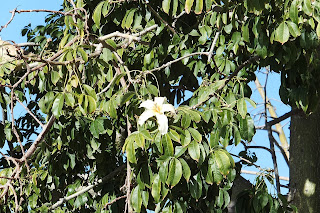The bird-of-paradise flower (Strelitzia reginae) would definitely not survive outdoors in the UK.
Saturday, 25 February 2017
Houseplants in the garden
A source of cognitive dissonance when visiting Spain is the appearance of many plants I grew up with as houseplants being in the gardens outside and growing to immense proportions. For example, these poinsettias (Euphorbia pulcherrima, Latin for "beautiful spurge") are rather big:
More pictures after the break.
The bird-of-paradise flower (Strelitzia reginae) would definitely not survive outdoors in the UK.
Other causes of agriculture shock are trees I would associate with greenhouses in botanical gardens, like the Palo borracho (drunk wood, as the wood was said to be used to make bowls for fermenting alcoholic beverages in South America). The botanical name is Ceiba insignis, showing its close relationship to the kapok tree, Ceiba pentandra. The Palo borracho also has abundant cottony fibres in the fruit which can be used in a similar way to kapok. It is mainly grown as an ornamental for its flowers and ornamental "bottle" trunk covered in spines. The plant was considered a member of the Bombacaceae family but with the latest genetic studies that family has been made a subfamily of the mallow family Malvaceae. This example was in the street in Malaga:
Just across the street was a small, unhappy-looking tree that was not flowering but, from the seedpods, I think is a Brachychiton. This has also been brought into the Malvaceae family as part of the old Sterculiaceae, the family that includes chocolate and cola.
Then there are the relatives of things you know that are very different from the ones you know like this huge, climbing, succulent-leaved ragwort, Senecio angulatus. It was intertwined with a morning glory (Ipomoea) with mostly faded flowers.
Then, mind reeling from a week of strange exotics and unusual native plants you see something glowing golden by the roadside and think..."that looks like a dandelion".
The bird-of-paradise flower (Strelitzia reginae) would definitely not survive outdoors in the UK.




















